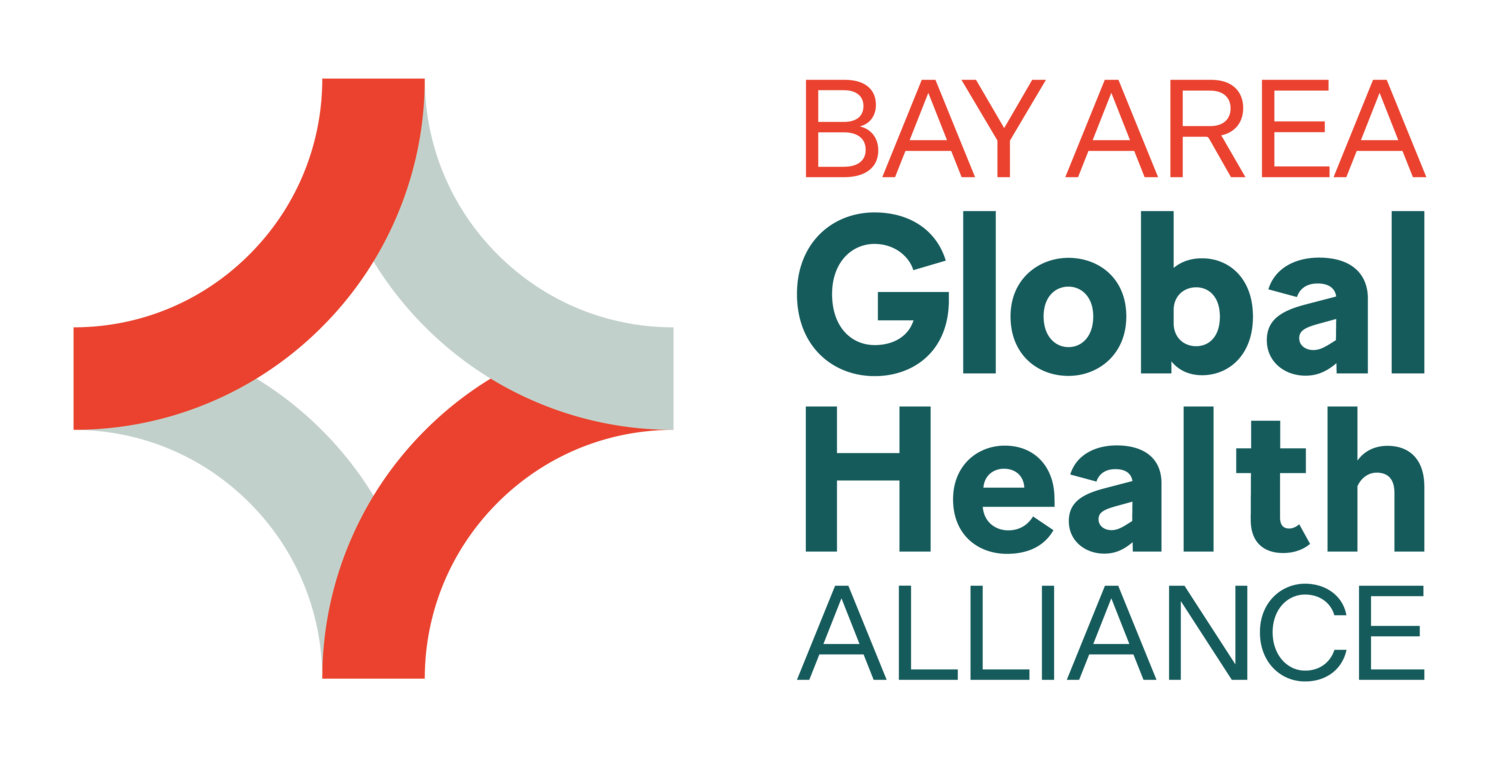
Colin Boyle, Alliance board chair and Lecturer at UC Berkeley Haas School of Business, welcoming attendees.
“Global health really is a team effort,” said Colin Boyle, Alliance board chair and Lecturer at UC Berkeley Haas School of Business, opening the Bay Area Global Health Alliance’s 4th Annual Meeting, where multisectoral members convened on May 21 to discuss bridging gaps and enhancing collaborative efforts across various sectors to tackle pressing health issues worldwide.
The meeting’s agenda included updates on the Alliance’s progress and discussions on crucial topics such as women’s health equity, multi-sector partnerships, and the intersection of climate and health. High-profile speakers from organizations like Wellcome Trust, Africa Health Business, Americares, Cross-Border Impact Ventures, Gilead Sciences, Google, Medicines360, Merck for Mothers, PATH, Roche Diagnostics, and Stanford Byers Center for Biodesign shared their own insights and strategies, while continuing to underscore the critical need for collaboration. Highlights from the discussions follow.
Bridging the Gap: Innovations, Investments and Collaborations for Women’s Health Equity

Neha Agarwal, Alliance board vice-chair and Global Diagnostics Program Co-Director at PATH, introducing panelists.
With the notable momentum in addressing women’s health equity as highlighted by recent influential reports from McKinsey, NIH, and the Gates Foundation as the backdrop, this panel discussed how innovative strategies and investments can help close the health service delivery gaps that disproportionately affect women, particularly in low-resource settings.
“In the past six months, we’ve made significant strides and groundbreaking reports and initiatives have been put forward, but women’s health is still a neglected issue,” said Huma Abbasi, Alliance board member and General Manager of Global Health & Medical at Chevron, kicking off the discussion on women’s health equity.
Here are the key takeaways from the discussion moderated by Neha Agarwal, Alliance board vice-chair and Global Diagnostics Program Co-Director at PATH:
1. Potential of Digital Health Technologies: There was a strong emphasis on the transformative potential of digital health tools, such as mobile health applications and telemedicine, to improve access to health care services for women and ensure quality of care, but also caution.
“The solution isn’t always a shiny new toy. We need to make shiny new toys, but we also need to get real about taking the tools we have, figuring out how to make them work, and recognizing that technology is part of the solution, not the solution itself,” said Joanna Sickler, Vice President of Health Policy & External Affairs at Roche Diagnostics.
She discussed how digital health technologies, particularly in diagnostics, can tackle specific challenges in women’s health, such as cervical cancer prevention. She advocated for the integration of these technologies into primary care and preventative services to enhance health outcomes. “High-income countries’ health systems are built on sick care, which is not financially sustainable….The opportunity exists in many low- and middle-income countries to learn from their mistake [with the sick care system] and start investing in places that are going to be the most cost-effective for overall population health impact, which includes strengthening primary care, health systems, screening, and prevention.”
2. Importance of Equity in Innovation: Margot Fahnestock, Vice President of Strategic Development at Medicines360 discussed the dual focus of innovation coupled with equity. She stressed the importance of making healthcare innovations both accessible and affordable to ensure that advancements are equitably distributed.
“We think about this innovation question and equity question actively every day, but the question is, how can you do both? How can you have innovation, which requires a lot of investment and time, and then accelerate that timeline to when women actually get equitable access and can afford products that they need and want?”
3. Challenges of Implementation and Sustainability: “Africa is not one market. It is many different countries with different settings and ecosystems that we need to listen to, to ensure that innovations can actually work and come to the ground,” said Esther Ruiter, Project Manager at Africa Health Business.
She argued for stronger regional cooperation to facilitate the effective introduction of health innovations. “Innovation and digital health is on the rise massively here in Africa,” she continued. “The Africa CDC has started with the new public health order, which is great within Africa itself. We’re starting to have more collaboration within the continent, which will hopefully make it easier for products and initiatives to enter these markets.”
4. Venture Capital (VC) and Investment Opportunities: Annie Theriault, Managing Partner at Cross-Border Impact Ventures, pointed out emerging opportunities for investors in the field of women’s health.
“The pipeline [of innovations] is not the issue, but we certainly need to generate more interest from limited partners to invest in funds so that our approach of investing can proliferate a little more broadly as opposed to the typical VC approach of build a company in the US – begin to scale, exit, and sometimes down the road those markets [in low income countries] will be targeted,” said Theriault. Cross-Border Impact Ventures steps in to “select companies that have products that are lower cost, easier to use and can be translatable into the African markets.”
5. Collaboration Across Sectors: The panel underscored the importance of multi-sector partnerships in advancing women’s health, involving collaboration between government, private sector, and non-profit organizations to pool resources, knowledge, and expertise.
“If we can leverage the power between nonprofits and for-profits across the sector, there’s really a whole lot we can get done together,” Fahnestock concluded.
Forging Ahead Together: Overcoming Barriers in Multi-Sector Global Health Partnerships

Megan Ryskamp, Alliance board member and Director of Social Impact Partnerships at Google, speaking to the audience.
Despite the widely acknowledged power of multi-sector collaborations, the Alliance’s recent work on the intersection of implementation science and health equity found that there are still significant obstacles. By drawing on the experiences of Alliance private sector members who are spearheading innovative partnerships in global health, this panel discussion provided insights into how to navigate the persistent challenges and push forward the transformative potential of multi-sector partnerships.
Panelists underscored the importance of strategic, inclusive, and adaptive partnerships in the implementation of health equity initiatives, leveraging the strengths of diverse sectors to achieve common goals. Krista Donaldson, Alliance board member and Director of Innovation to Impact at Stanford Byers Center for Biodesign, moderated the panel. Here are the highlights.
1. Critical Role of Implementation Science: “Medicine is only as good as the system that delivers it,” explained Thu Do, Director of Medical Affairs and Global Patient Solutions at Gilead Sciences. She emphasized that the success of medical advancements, like those in virology and HIV, depends not just on their development but also on ensuring they reach the right places and are utilized properly. She elaborated on the importance of the Alliance’s recent implementation science and health equity work, explaining that it addresses the critical issue of delivering transformative therapies effectively to communities with the greatest unmet need.
2. Community-Based Partnership Strategies: Community-based partnerships must be tailored to the specific needs and dynamics of the communities to be successful. Mark Allen, Alliance board member and Director of Strategic Partnerships and Global Programs at Merck for Mothers, illustrated this through the Safer Childbirth Cities Initiative, which focuses on addressing health disparities and broader social determinants of health in urban settings, particularly within the African-American community. “In order to be able to do that [work] most effectively, we had to be partnered at the community level,” said Allen. “It’s been a phenomenal entry into working with smaller organizations, as well as pulling other donors into that space,” explained Allen.
3. Learning from Tech’s Agile Approaches: “Some of the best partnerships have been the ones that pivot in response to user needs,” said Megan Ryskamp, Alliance board member and Director of Social Impact Partnerships at Google. Donaldson had asked how the global health sector could benefit from adopting the tech industry’s methods of quick iteration and a strong feedback culture. Ryscamp explained that this approach of pivoting quickly fosters successful, long-term partnerships and more effectively meets changing user needs. “It really has been this feedback loop of proactively identifying the issues, seeing that feedback, hearing that feedback, and then acting on it quickly, which has led to some very fruitful partnerships,” said Ryskamp. Allen added, “The private sector has an expectation of being much more dynamic and using evidence to constantly recalibrate.”
4. Importance of Equitable Collaborations: The panel also touched on developing an operational partnership framework to optimize equitable collaborations. This involves ensuring that all partners have a voice and that outcomes are beneficial for all stakeholders, particularly those in marginalized communities. Panelists highlighted how essential it is to have all relevant stakeholders at the table to ensure that efforts in health system strengthening are comprehensive and effective. “In global health, we know that everyone should have a seat at the table when it comes to health systems strengthening, especially governments and communities. We in the private sector value that collaboration highly and are looking for ways to enable more meaningful engagement,” said Do.
5. Barriers, Opportunities and the Need for Partnership Brokers: The discussion also acknowledged the barriers faced in forming and maintaining effective partnerships, such as aligning diverse goals and navigating different organizational constraints and cultures. However, initial ideas for overcoming these barriers include clear communication, shared goals, and mutual respect among partners. “It’s difficult to show progress on something as intangible as partnership alignment and meeting the transparency needs of all partners. But we know it’s important, which is why the Alliance’s role as an honest broker can enable healthier partnership processes to deepen listening, educating, and collaboration across sectors,” said Do.
Allen elaborated, “We’ve discussed how the Bay Area Global Health Alliance can be really useful in partnerships, because so much of who we’ve engaged with, whether it’s on the academic side, the implementation side, or even fellow donors, there’s always going to be some agenda or some incentive or bias in terms of what they bring to the table. That’s helpful, but in the sense of trying to actually figure out the best solution, having somebody to broker that sort of neutral conversation and pull all of the different perspectives together is really helpful and really informative.”
Putting Health at the Heart of Global Climate Change Action

Alexandra Destler, Senior Director of the Western Region at Americares, introducing Alan Dangour, Director of Climate and Health at Wellcome Trust.
In a dialogue on the pressing intersection of climate change and global health, Wellcome Trust’s Alan Dangour, Director of Climate and Health, joined Alexandra Destler, Senior Director of the Western Region at Americares, for a fireside chat that highlighted both the challenges and the imperatives of addressing these intertwined crises.
The conversation commenced with Destler unveiling the results of the Alliance’s recent Planetary Health / Climate Change and Health survey, which aimed to pinpoint organizational needs. The survey identified key areas where organizations required support: funding, partnerships, ecosystem mapping, business case support, and enhanced research and evidence. Destler stressed the urgency and interconnection of climate and health issues.
Here are the key takeaways from Destler’s conversation with Dangour.
1. Integration of Climate and Health in Research: Dangour emphasized the need to integrate health issues into the climate change agenda more robustly, highlighting a strategic focus of Wellcome Trust in this area. “There needs to be a massive increase in the availability of evidence, especially in low- and middle-income countries where there is hardly any. And in those countries – they are most affected,” remarked Dangour.
2. Collaborative Efforts: In response to Destler’s question about the recently announced Bill & Melinda Gates Foundation, Novo Nordisk Foundation, and Wellcome Trust $300 million commitment to climate change, infectious diseases, and nutrition, Dangour stressed the importance of collaboration among global health funders to advance climate and health objectives. He suggested that these collaborations could lead to substantial progress by pooling resources and aligning strategies.
3. Broad and Diverse Community Engagement: A major point made by Dangour was the necessity of engaging a wide and diverse range of stakeholders in the climate and health discourse. “It is so important that we engage as broad and as diverse a community as possible. We bring in the expertise that already exists, we bring in new partners, and we bring in new groups that want to engage on this topic, and those that don’t, we convince them why they should,” said Dangour.
4. Preparedness for Climate Impacts on Health: Dangour highlighted the future challenges that climate change poses to global health and the urgency of preparing for these impacts. He underscored the transformative effect climate change will have on global health.
5. Educational and Advocacy Role: Finally, Dangour pointed out the need for increased awareness and education regarding the interlinkages between climate change and health. He spoke about the role of Wellcome Trust and other organizations in spreading this message to ensure a broader understanding and commitment to addressing these crucial issues.
“The next generation of global health will be entirely shaped by climate change, and we’re not ready. We are nowhere near ready. So for me, it’s about spreading this message,” concluded Dangour.
The State of the Alliance

Sara Anderson, Executive Director of the Alliance, addressing the audience.
“I am filled with immense gratitude for the progress the Bay Area Global Health Alliance has made since its inception in 2020,” said Sara Anderson, Executive Director of the Alliance. “Our theory of change hinges on the belief that collaboration across multiple sectors and geographies is essential to tackle today’s complex global health challenges. Together we really can advance global health innovation and equity,” said Anderson.
Recent progress includes the enhancement of partnerships in low- and middle-income countries, efforts to amplify diverse voices, and participation in significant events like the White House Roundtable on AI and Health and the J.P. Morgan Healthcare Conference. Other initiatives include: the ongoing four-part AI and Global Health Discussion Series, sponsored by Pfizer; the exploration of health equity through implementation science, backed by Gilead Sciences; and the Alliance’s ongoing strategic planning process, which had critical pro-bono support from new member Boston Consulting Group.
“Building Bridges, Uniting for Impact [the meeting’s title] is not just a nod to the iconic Golden Gate Bridge here in San Francisco,” said Boyle. “We really are a global alliance now, and that’s important. So it’s not just the nods to our bridge here, but also an affirmation of the need for building bridges across organizations, across sectors and across regions.”
“The Alliance is more than just an organization; it is a trusted community that transcends traditional silos and boundaries to foster impactful change,” concluded Anderson.
Special thanks to Alliance board member Natasha Sunderji and Accenture for offering their space in Salesforce Tower for the Bay Area Global Health Alliance 2024 Annual Meeting.
About our Speakers
Bridging the Gap: Innovations, Investments and Collaborations for Women’s Health Equity
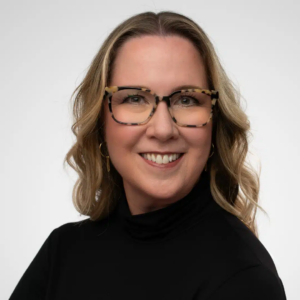 Margot Fahnestock, Vice President of Strategic Development, Medicines360. Margot leads mission-based program development, impact measurement, and resource mobilization. As a philanthropy and policy expert in family planning and reproductive health, Margot formerly served as a Program Officer at the William and Flora Hewlett Foundation, responsible for making grants to reduce unintended pregnancies and improve reproductive health and rights in sub-Saharan Africa. She was a founding member and catalyst for the Ouagadougou Partnership, which has mobilized more than $250 million in additional funding for family planning in Francophone West Africa. Prior to Hewlett, Margot was a policy analyst and project manager at Futures Group, providing technical and managerial oversight for family planning, HIV/AIDS, and malaria policy programs. Margot served two years as a U.S. Peace Corps volunteer teaching English at a secondary school in Mali, West Africa. She has a bachelor’s degree in English from the University of California, Los Angeles and master’s in public policy from the University of Chicago.
Margot Fahnestock, Vice President of Strategic Development, Medicines360. Margot leads mission-based program development, impact measurement, and resource mobilization. As a philanthropy and policy expert in family planning and reproductive health, Margot formerly served as a Program Officer at the William and Flora Hewlett Foundation, responsible for making grants to reduce unintended pregnancies and improve reproductive health and rights in sub-Saharan Africa. She was a founding member and catalyst for the Ouagadougou Partnership, which has mobilized more than $250 million in additional funding for family planning in Francophone West Africa. Prior to Hewlett, Margot was a policy analyst and project manager at Futures Group, providing technical and managerial oversight for family planning, HIV/AIDS, and malaria policy programs. Margot served two years as a U.S. Peace Corps volunteer teaching English at a secondary school in Mali, West Africa. She has a bachelor’s degree in English from the University of California, Los Angeles and master’s in public policy from the University of Chicago.
 Joanna Sickler, Vice President, Health Policy & External Affairs, Roche Diagnostics. Joanna’s background spans diagnostic, pharmaceutical and non-governmental organizations with a focus on public health, implementation science and policy to optimize medical value. She has a passion for improving people’s lives through access to healthcare innovations. Previously, at Roche Diagnostics, Joanna was Senior Director, Medical Affairs, where she was responsible for developing and executing the point-of-care molecular global medical strategy and leading clinical impact studies across the molecular infectious disease portfolio. This included a heavy emphasis on respiratory tests and a focus on pandemic response to COVID-19. Previously, at Zyomyx, she led market access strategy, policy and the post-approval clinical study programme to support the launch of the company’s first product, a point-of-care CD4 test for use in limited-resource settings. As part of the Access Program’s leadership team at the Clinton Health Access Initiative (CHAI), she developed models and led advocacy for global procurement interventions to ensure the sustainability of the children’s HIV drug market. She collaborated with ministries of health throughout Africa to support the HIV Guidelines revision process and assess the cost impact of changes. Joanna holds a Master’s in Public Health and a Master’s in Business Administration from the University of California, Berkeley. She received her Bachelor of Arts from Wesleyan University.
Joanna Sickler, Vice President, Health Policy & External Affairs, Roche Diagnostics. Joanna’s background spans diagnostic, pharmaceutical and non-governmental organizations with a focus on public health, implementation science and policy to optimize medical value. She has a passion for improving people’s lives through access to healthcare innovations. Previously, at Roche Diagnostics, Joanna was Senior Director, Medical Affairs, where she was responsible for developing and executing the point-of-care molecular global medical strategy and leading clinical impact studies across the molecular infectious disease portfolio. This included a heavy emphasis on respiratory tests and a focus on pandemic response to COVID-19. Previously, at Zyomyx, she led market access strategy, policy and the post-approval clinical study programme to support the launch of the company’s first product, a point-of-care CD4 test for use in limited-resource settings. As part of the Access Program’s leadership team at the Clinton Health Access Initiative (CHAI), she developed models and led advocacy for global procurement interventions to ensure the sustainability of the children’s HIV drug market. She collaborated with ministries of health throughout Africa to support the HIV Guidelines revision process and assess the cost impact of changes. Joanna holds a Master’s in Public Health and a Master’s in Business Administration from the University of California, Berkeley. She received her Bachelor of Arts from Wesleyan University.
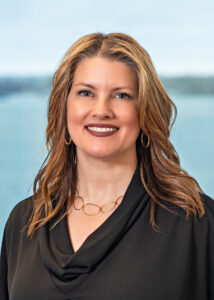 Annie Theriault, Managing Partner, Cross-Border Impact Ventures. Annie has been immersed in impact investing, venture capital, royalty financing, and capital markets throughout her career. As a venture capital investor and venture advisor, she worked with high impact companies to mobilize more than $100 million in non-dilutive capital. Annie was previously a director on the boards of several North American venture-backed companies, is an advisor to crowdfunding fintech company FrontFundr, and, prior to the launch of CBIV, was Chief Investment Officer at Grand Challenges Canada. Annie obtained her PhD in Management from the Rotman School of Management at the University of Toronto, is a CFA Charterholder, and holds the ICD.D designation. She also has a master’s degree in Business Economics from Wilfrid Laurier University and a Bachelor of Science with First Class Honours in Chemistry from Mount Allison University.
Annie Theriault, Managing Partner, Cross-Border Impact Ventures. Annie has been immersed in impact investing, venture capital, royalty financing, and capital markets throughout her career. As a venture capital investor and venture advisor, she worked with high impact companies to mobilize more than $100 million in non-dilutive capital. Annie was previously a director on the boards of several North American venture-backed companies, is an advisor to crowdfunding fintech company FrontFundr, and, prior to the launch of CBIV, was Chief Investment Officer at Grand Challenges Canada. Annie obtained her PhD in Management from the Rotman School of Management at the University of Toronto, is a CFA Charterholder, and holds the ICD.D designation. She also has a master’s degree in Business Economics from Wilfrid Laurier University and a Bachelor of Science with First Class Honours in Chemistry from Mount Allison University.
 Esther Ruiter, Project Manager, Africa Health Business. Esther is a fully qualified and registered midwife in Belgium and Kenya. She has over ten years of experience ranging from clinical midwifery, training, and management roles, in both private and public healthcare settings. Esther’s experience in different contexts, and her motivation to be part of a much-needed, effective and sustainable change within the different healthcare sectors to improve access and quality of care for all, drive her towards achieving this. To enable her skills and to be able to be part of this change, Esther graduated with a Master’s in Public Health at the London School of Hygiene and Tropical Medicine in 2021. With a huge interest and admiration for what AHB does, she has now taken on the role of Project Manager to further grow and pursue her desire to play an active role in improving equitable health care and reducing health disparity.
Esther Ruiter, Project Manager, Africa Health Business. Esther is a fully qualified and registered midwife in Belgium and Kenya. She has over ten years of experience ranging from clinical midwifery, training, and management roles, in both private and public healthcare settings. Esther’s experience in different contexts, and her motivation to be part of a much-needed, effective and sustainable change within the different healthcare sectors to improve access and quality of care for all, drive her towards achieving this. To enable her skills and to be able to be part of this change, Esther graduated with a Master’s in Public Health at the London School of Hygiene and Tropical Medicine in 2021. With a huge interest and admiration for what AHB does, she has now taken on the role of Project Manager to further grow and pursue her desire to play an active role in improving equitable health care and reducing health disparity.
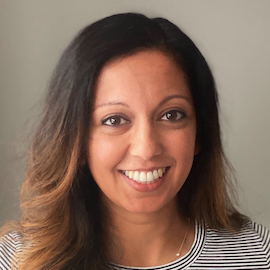 Neha Agarwal, Global Diagnostics Program Co-Director at PATH. Neha is a passionate advocate for global health equity and approaches her work with a strong vision for sustainability, respectful collaborations, innovation, and analytical rigor. She has over 15 years of experience in global health and the life sciences. Neha is currently the Global Diagnostics Program Co-Director for PATH where she leads a team responsible for improving and ensuring equitable access to essential diagnostic products in resource-limited settings. She held previous global health roles at the Clinton Health Access Initiative (CHAI) and Applied Strategies. In her various roles, Neha has focused on bridging partnerships between industry, governments, and the non-profit sector. Prior to her transition to global health, Neha’s career focused innovative product development at companies such as Johnson & Johnson and Verinata Health (now Illumina), earning her several patents for lab-on-chip and drug delivery technologies. Neha is passionate about utilizing the talent, scientific rigor, and innovative energy of the Bay Area to achieve health equity around the globe. Ms. Agarwal has several publications, holds 4 patents, and received her MS in biomedical engineering from Columbia University and her BS in bioengineering from University of California, Berkeley.
Neha Agarwal, Global Diagnostics Program Co-Director at PATH. Neha is a passionate advocate for global health equity and approaches her work with a strong vision for sustainability, respectful collaborations, innovation, and analytical rigor. She has over 15 years of experience in global health and the life sciences. Neha is currently the Global Diagnostics Program Co-Director for PATH where she leads a team responsible for improving and ensuring equitable access to essential diagnostic products in resource-limited settings. She held previous global health roles at the Clinton Health Access Initiative (CHAI) and Applied Strategies. In her various roles, Neha has focused on bridging partnerships between industry, governments, and the non-profit sector. Prior to her transition to global health, Neha’s career focused innovative product development at companies such as Johnson & Johnson and Verinata Health (now Illumina), earning her several patents for lab-on-chip and drug delivery technologies. Neha is passionate about utilizing the talent, scientific rigor, and innovative energy of the Bay Area to achieve health equity around the globe. Ms. Agarwal has several publications, holds 4 patents, and received her MS in biomedical engineering from Columbia University and her BS in bioengineering from University of California, Berkeley.
Forging Ahead Together: Overcoming Barriers in Multi-Sector Global Health Partnerships
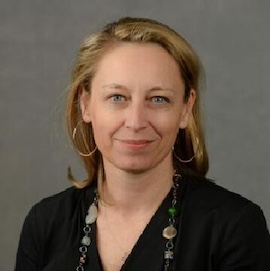 Krista Donaldson, Director of Innovation to Impact at Stanford Byers Center for Biodesign. As Director of Innovation to Impact at Stanford Byers Center for Biodesign, Krista’s work focuses on ensuring that design tools and processes are broadly applicable across global markets. She is also part of the team establishing the East Africa Biodesign Program, which kicked off in early 2023. Stanford’s Biodesign program advances health outcomes and equity through innovation education, translation, and policy. As the former CEO of Equalize Health (formerly D-Rev), Krista led the design and scaling of disruptive medical devices to address global health inequities. To date, nearly 1M people – mostly children and young people – have been treated by one of Equalize Health’s products in 70+ countries. Peter Singer of the Effective Altruism movement called Equalize Health “one of the world’s best charities” because of its cost effectiveness and exemplary end-to-end processes.
Krista Donaldson, Director of Innovation to Impact at Stanford Byers Center for Biodesign. As Director of Innovation to Impact at Stanford Byers Center for Biodesign, Krista’s work focuses on ensuring that design tools and processes are broadly applicable across global markets. She is also part of the team establishing the East Africa Biodesign Program, which kicked off in early 2023. Stanford’s Biodesign program advances health outcomes and equity through innovation education, translation, and policy. As the former CEO of Equalize Health (formerly D-Rev), Krista led the design and scaling of disruptive medical devices to address global health inequities. To date, nearly 1M people – mostly children and young people – have been treated by one of Equalize Health’s products in 70+ countries. Peter Singer of the Effective Altruism movement called Equalize Health “one of the world’s best charities” because of its cost effectiveness and exemplary end-to-end processes.
 Megan Ryskamp, Alliance board member; Director of Social Impact Partnerships, Google. Megan has worked at the intersection of technology, partnerships, and social impact for more than twenty years and currently leads Google’s global Social Impact Partnerships team. She connects nonprofit organizations, governments, intergovernmental groups and other social impact-aligned partners with Google products to advance the mission of organizing the world’s information in important social impact areas such as health, economic opportunity, crisis response, climate, education and arts & culture, among others. These partnerships have been focused on bringing important information to users around the globe, helping them find access to healthcare, identify critical services, get help in a crisis, navigate changes in climate, engage in learning, and explore the arts. Prior to Google, Megan worked on Adobe’s emerging markets strategy and developed partnerships with governments and schools to enable Cisco’s technology education program in more than 50 countries. Megan holds a BA from Stanford University and an MBA from the Haas School of Business at UC Berkeley.
Megan Ryskamp, Alliance board member; Director of Social Impact Partnerships, Google. Megan has worked at the intersection of technology, partnerships, and social impact for more than twenty years and currently leads Google’s global Social Impact Partnerships team. She connects nonprofit organizations, governments, intergovernmental groups and other social impact-aligned partners with Google products to advance the mission of organizing the world’s information in important social impact areas such as health, economic opportunity, crisis response, climate, education and arts & culture, among others. These partnerships have been focused on bringing important information to users around the globe, helping them find access to healthcare, identify critical services, get help in a crisis, navigate changes in climate, engage in learning, and explore the arts. Prior to Google, Megan worked on Adobe’s emerging markets strategy and developed partnerships with governments and schools to enable Cisco’s technology education program in more than 50 countries. Megan holds a BA from Stanford University and an MBA from the Haas School of Business at UC Berkeley.

Thu Do, Director, Medical Affairs, Global Patient Solutions, Gilead Sciences. Thu is a Director on Gilead’s Global Patient Solutions Medical Affairs Team. She has worked on global health policy, advocacy, and partnerships at the intersection of the public and private sectors. She’s focused on increasing access to essential commodities for health in LMICS, including family planning, WASH, infectious disease, and NCDs. She’s worked across the public and private sectors at USAID, Results for Development, Novartis, and Malaria No More. She received her bachelor’s degree in Ethics, Politics and Economics and her MPH in Health Management at Yale College and School of Public Health.
 Mark Allen, Alliance board member; Director of Strategic Partnerships and Global Programs, Merck for Mothers. Mark has had over 20 years of professional experience in both the private and international development sector. Currently Merck for Mothers’ Director of Strategic Partnerships and Global Programs, Mark is responsible for managing strategic partners across the program portfolio as well as oversight on the initiative’s global programming including Merck for Mothers’ digital portfolio. Prior to Merck for Mothers, Mark was the Managing Director for Africa Programs with Malaria No More managing the organization’s investments across six countries. Mark started his professional career in international development at the Touch Foundation — a McKinsey and Co.-founded organization focused on building human resource capacity in the health sector in Tanzania. Prior to the Touch Foundation, Mark lived in rural Kenya as a Peace Corps Volunteer focusing on micro-enterprise development with farmers which inspired his shift from an earlier career in management consulting. Mark holds a B.S. in Industrial Engineering from the Georgia Institute of Technology and a master’s in International Affairs from Columbia University.
Mark Allen, Alliance board member; Director of Strategic Partnerships and Global Programs, Merck for Mothers. Mark has had over 20 years of professional experience in both the private and international development sector. Currently Merck for Mothers’ Director of Strategic Partnerships and Global Programs, Mark is responsible for managing strategic partners across the program portfolio as well as oversight on the initiative’s global programming including Merck for Mothers’ digital portfolio. Prior to Merck for Mothers, Mark was the Managing Director for Africa Programs with Malaria No More managing the organization’s investments across six countries. Mark started his professional career in international development at the Touch Foundation — a McKinsey and Co.-founded organization focused on building human resource capacity in the health sector in Tanzania. Prior to the Touch Foundation, Mark lived in rural Kenya as a Peace Corps Volunteer focusing on micro-enterprise development with farmers which inspired his shift from an earlier career in management consulting. Mark holds a B.S. in Industrial Engineering from the Georgia Institute of Technology and a master’s in International Affairs from Columbia University.
Short Fireside Chat: Putting Health at the Heart of Global Climate Change Action
 Alan Dangour, Director of Climate and Health, Wellcome. Alan leads the Climate and Health team in the delivery of Wellcome’s strategy in this new challenge area. He joined Wellcome in January 2022 to lead an ambitious new Climate and Health strategy that seeks to put health at the heart of global climate change action.For the past 20 years, Alan worked at the London School of Hygiene and Tropical Medicine (LSHTM) where he was Professor of Food and Nutrition for Global Health. At LSHTM, Alan led an interdisciplinary team working on the interconnections between environmental change, food systems and health and was the Director of the Centre on Climate Change and Planetary Health. Alan has substantial experience working internationally and with government partners – he was a Senior Research Fellow for the UK Department for International Development and an Expert Advisor for the Environmental Audit Office of the UK Parliament.
Alan Dangour, Director of Climate and Health, Wellcome. Alan leads the Climate and Health team in the delivery of Wellcome’s strategy in this new challenge area. He joined Wellcome in January 2022 to lead an ambitious new Climate and Health strategy that seeks to put health at the heart of global climate change action.For the past 20 years, Alan worked at the London School of Hygiene and Tropical Medicine (LSHTM) where he was Professor of Food and Nutrition for Global Health. At LSHTM, Alan led an interdisciplinary team working on the interconnections between environmental change, food systems and health and was the Director of the Centre on Climate Change and Planetary Health. Alan has substantial experience working internationally and with government partners – he was a Senior Research Fellow for the UK Department for International Development and an Expert Advisor for the Environmental Audit Office of the UK Parliament.
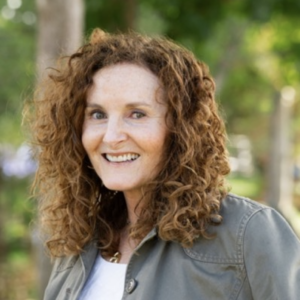 Alexandra Destler, Senior Director, Western Region, Americares. For over two decades, Alexandra has worked to spark swift change in our public health system. Her aim? To promote global environmental sustainability – not in theory but in practice. Rather than preaching to the converted, she brings together public and private organizations, champions and naysayers, leading healthcare, non-profit and Fortune 500 companies, to drive change. Alexandra currently serves as Americares Senior Managing Director where she leads all aspects of growth across domestic western regions, including scaling strategic partnerships with foundations, corporations, individuals, academic and health institutions. She also designs and leads thought leadership opportunities focused on climate, health and health equity. Previously, she launched the Public Health Institute’s Center for Climate Change and the American Hospital Association’s environmental stewardship initiative; co-developed The Greenfield Path, a communications project driving Ford Motor Company’s move to a more sustainable business. Finally, distressed by the lack of easily accessible health information about toxic chemicals that is consumer focused and actionable for all pregnant women and new families, particularly women of color, she founded and passionately leads a start-up called SafetyNEST. Alexandra serves as an advisor to NIEHS Center on Health and Environment Across the Life Span @ Mount Sinai Icahn School of Medicine. She holds degrees from Harvard, Cornell and the Sorbonne.
Alexandra Destler, Senior Director, Western Region, Americares. For over two decades, Alexandra has worked to spark swift change in our public health system. Her aim? To promote global environmental sustainability – not in theory but in practice. Rather than preaching to the converted, she brings together public and private organizations, champions and naysayers, leading healthcare, non-profit and Fortune 500 companies, to drive change. Alexandra currently serves as Americares Senior Managing Director where she leads all aspects of growth across domestic western regions, including scaling strategic partnerships with foundations, corporations, individuals, academic and health institutions. She also designs and leads thought leadership opportunities focused on climate, health and health equity. Previously, she launched the Public Health Institute’s Center for Climate Change and the American Hospital Association’s environmental stewardship initiative; co-developed The Greenfield Path, a communications project driving Ford Motor Company’s move to a more sustainable business. Finally, distressed by the lack of easily accessible health information about toxic chemicals that is consumer focused and actionable for all pregnant women and new families, particularly women of color, she founded and passionately leads a start-up called SafetyNEST. Alexandra serves as an advisor to NIEHS Center on Health and Environment Across the Life Span @ Mount Sinai Icahn School of Medicine. She holds degrees from Harvard, Cornell and the Sorbonne.
